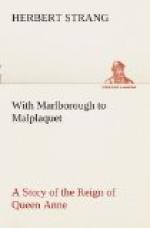The prophecy was not far wrong. Almost before dawn the very next morning Marlborough was marching, with twelve thousand men, largely cavalry, towards the Queich valley, across a bit of country that for badness could hardly be matched even in the wilds of Connemara. On man and horse tramped, till the ancient city of Treves was reached. The Duke prepared for a siege, but he was saved the trouble. The garrison was far too weak to hold the place, and the place fell into his hands almost without a blow. George Fairburn grumbled at his luck, but was cheered by Matthew’s laughing reply, “Don’t seek to rush things too quickly, my dear lad; your time is coming.”
It was. After ordering the siege of Traerbach, Marlborough flew back with a portion of his men to Landau, in his own breathless fashion, and before many hours were over Fairburn was as keenly interested in the siege as if he had never scampered all the way to Treves and back again. A week or two passed by, and still the place held out, though it was plain the end was near.
One day a sudden assault was planned on a weak spot in the defences, a spot where some earlier damages had been ineffectively repaired. George, with a troop of cavalry on foot, under the orders of Lieutenant Blackett, suddenly started off at the double, spurred by their officer’s “Come along, lads! through or over!” With a roar of delight the men, mostly young fellows, dashed toward the spot, regardless of the whistling bullets that flew around. In a breach of the defences, a place not more than four or five feet wide, stood a huge Frenchman, whirling his sword over his head. The attackers pulled up for a moment, all except George, who kept right on, till he was close upon the big fellow with the sword. The Frenchman lunged out fiercely at the lad, but the Englishman skipped out of the way like a cat. Then before the man could use his weapon again George had charged him head first, like a bull, his body bent double. With a shock his head came into contact with the fellow’s knees, and in a moment the Frenchman had tumbled helplessly on his face. The rest of Blackett’s little band dashed over the prostrate enemy and into the fortress. The stronghold was taken.
“Send Cornet Fairburn to me, Mr. Blackett,” said the colonel that same evening, and much wondering the lieutenant obeyed.
“Cornet Fairburn sounds well,” he remarked to George. “Wonder if the old colonel has made a mistake about it.”
There was no mistake at all. When George Fairburn returned from his interview with his commanding officer, it was as Cornet, not as Trooper Fairburn. It was by the Duke’s own order, it appeared. That night the three friends, all with commissions in their pockets now, made merry in company. Sir George Rooke’s desire had been speedily realized, and George had taken his first step upwards.
Marlborough marched to meet the King of Prussia, whom he persuaded to send some eight thousand troops to the help of the Duke of Savoy, in Italy. Then he went home to receive his honours, and the memorable campaign of 1704 came to an end.




